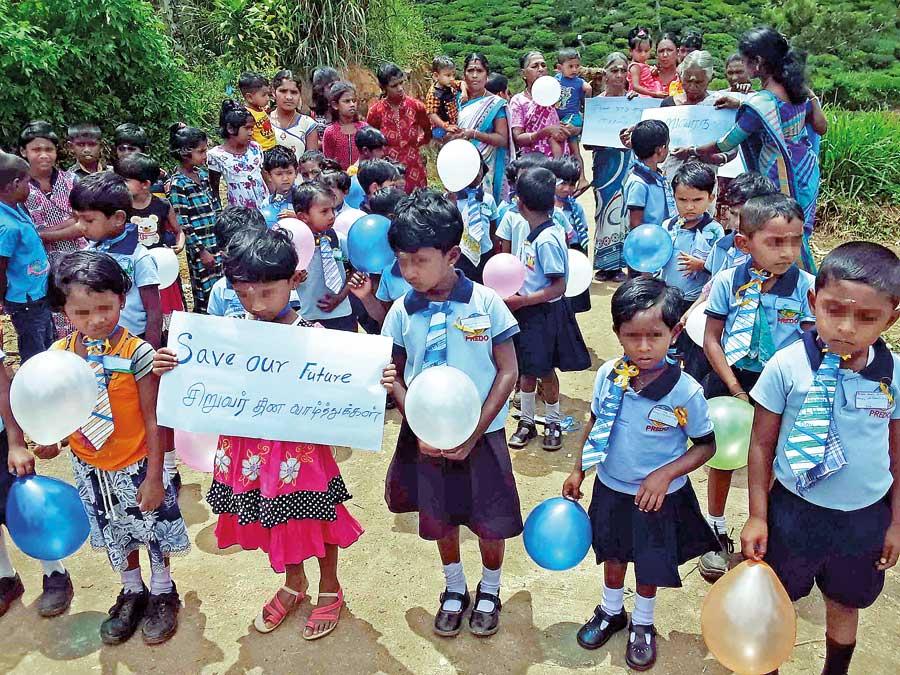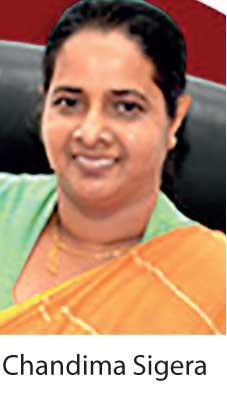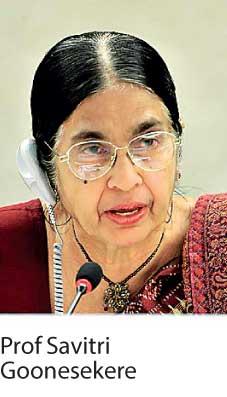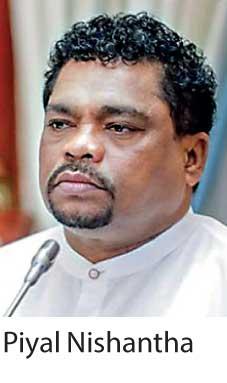02 Oct 2020 - {{hitsCtrl.values.hits}}

Many children in the estate sector only receive primary education. -Pic credits - K. Pushparaj
- As many as 20,000 cases relating to child sexual abuse have piled up at the AG’s Department over a decade
- A lot of children are sexually active from a young age and they don’t know what to do if they conceive
- There are several care homes and children are sent depending on the severity of the wrongdoing
As many as 31 underaged boys and girls living in unsafe environments were identified during a survey conducted in the Arachchikattuwa Grama Niladhari division in the Puttalam District. The reasons were manifold. When mothers leave for foreign employment, girls are left with their fathers and elder brothers. Orphaned children live with their relatives and some children live by themselves even though their parents are around. To add to the problem, many of these children were not schooling as well. Such unsafe environments set the precedent for the  rise in incidents of child abuse, harassment and rape. This is why in most instances the perpetrator is known to the victim. On a more worrying note, as many as 20,000 odd cases relating to child sexual abuse have piled up at the Attorney General’s Department over a decade while as many as 5292 cases of child sexual abuse have been reported during the first six months of 2020. Policy level decisions, stringent punishments for perpetrators, streamlining the relevant institutions and their objectives are important at this critical hour. In such a backdrop, whether it is apt to have islandwide celebrations in view of World Children’s Day, certainly remains a question.
rise in incidents of child abuse, harassment and rape. This is why in most instances the perpetrator is known to the victim. On a more worrying note, as many as 20,000 odd cases relating to child sexual abuse have piled up at the Attorney General’s Department over a decade while as many as 5292 cases of child sexual abuse have been reported during the first six months of 2020. Policy level decisions, stringent punishments for perpetrators, streamlining the relevant institutions and their objectives are important at this critical hour. In such a backdrop, whether it is apt to have islandwide celebrations in view of World Children’s Day, certainly remains a question.
Hence the Daily Mirror takes a look at why incidents tend to escalate in certain areas, how the communication gap between parents and the child contribute to the problem, dearth of psychological care and what the State Ministry could possibly do.
Situation reports
Monaragala
 In 2019, the National Child Protection Authority (NCPA) had received as many as 221 complaints of child abuse from the Monaragala District. Several incidents were reported this year as well. When inquired, a source at the Monaragala Police who spoke on conditions of anonymity said that children are by themselves when parents leave to the paddy fields early in the morning. “These are remote areas and even houses are located in isolated areas. Children take shortcuts to go to school, and these are less populated routes. There are some children who don’t go to school due to various reasons and we have identified them with the assistance of the Divisional Secretariat. Plans are underway to provide financial assistance to families that face difficulties and are therefore not sending their children to school.”
In 2019, the National Child Protection Authority (NCPA) had received as many as 221 complaints of child abuse from the Monaragala District. Several incidents were reported this year as well. When inquired, a source at the Monaragala Police who spoke on conditions of anonymity said that children are by themselves when parents leave to the paddy fields early in the morning. “These are remote areas and even houses are located in isolated areas. Children take shortcuts to go to school, and these are less populated routes. There are some children who don’t go to school due to various reasons and we have identified them with the assistance of the Divisional Secretariat. Plans are underway to provide financial assistance to families that face difficulties and are therefore not sending their children to school.”
The source further said that in most instances its consensual rape that takes place as most of them are young couples. “Children also get raped by relatives. But when compared to last year, we see a reduction in numbers this year. It could also be that most incidents go unreported because victims are reluctant to come to the Police and relate their experience. But once an underage victim is referred to us, we produce the matter to courts and the courts would decide whether the victim’s family is fit to provide further protection or whether the victim would be safe at a care home. This depends on the probation officer’s observations,” the source added.
Hill Country Plantation sector
The situation remains grim in Hill Country estates as well. A recent survey done by Save the Children – a charity focused on education, child protection, child rights governance, healthy and nutrition, livelihoods and humanitarian aspects revealed that 79.9% parents in the estate sector agree to the fact that the community/neighbourhood is not safe for their children. The survey further revealed that 73.5% children who are no longer in school have previously attended pre-school or school while 26.5% have never gone to school. According to Nadesan Suresh, Chairman of Uva Shakthi Foundation – a voluntary organisation established in 1996 to voice for the rights of communities living in tea/rubber plantations, rural villages and residential settlements, the school dropout rates are high in the estate sector. “If you take the Badulla District, there are around 145 primary schools and only a few schools have classes till A/Ls. Therefore parents think that studying upto Grade 5 would suffice. In order to go to another school they usually have to shift to an urban centre. There’s a lot of exploitation and trafficking that takes place in estates. Brokers would come and take children for child labour or domestic work. It is mainly underaged boys who work as helpers in garages, textile shops and the informal sector in metropolitan areas such as Kandy and Colombo.”
“But this is just one aspect,” he continued. “The reasons for most incidents of child abuse, rape and domestic violence are manifold. If you take a look at their settlements, they still live in line rooms. This was a concept introduced by the European planters back in 1823. Until 1932 most managers in these plantations were military officers. They constructed workers’ quarters similarly to barracks and this is how line rooms came into being. There’s one room with a partition where two families would live. So people have no privacy. Young couples would marry and return to the same line room. The elders and the rest of the family also lives in the same vicinity. This adds to the problem.”
According to Suresh it was only in 2003 that education and healthcare facilities were introduced to the estate sector. “This was also the year that they got citizenship. When countries such as South Africa, Uganda and Kenya have moved away from the ‘indentured labour system’, Sri Lanka’s plantation workers are still victims of it. If they want to move away from the plantation they have to get permission from the management. Therefore they only have the rights to vote but are deprived of any other rights. But this time a few women in the estate sector have gotten a quota in the local authorities but they still have a long way to go. They still don’t have a say in the trade unions and other governing bodies. Women need to be included at the decision-making level.”
He also said that administrative officers in local government authorities are reluctant to step into the plantations due to the language issue. “Most plantations are also governed by the Companies Act and there are administrative problems. Therefore many of these issues have worsened over the years. We see slight improvements in certain aspects but there’s still a long way to go.”
Parents have ignored children’s Right to Privacy
Several forms of child abuse including sexual and physical abuse, exploitation, emotional abuse as well as neglect have been identified. But Buddhini Withana, Senior Technical Advisor – Child Protection at Save the Children observes a weakening in the parent-child-teacher relationship. “Children don’t necessarily think that parents are there for them. If there’s an open line of communication, children would be able to place trust in their parents. Children are looking for response. A lot of children are sexually active from a young age and they don’t know what to do if they conceive. Sex is a natural need and they need to be made aware of safe sex. But since there’s a gap in the education system, children are not educated about sex and sexuality.”
Speaking about lesser spoken aspects of child abuse, she said exploitation also happens where children are either used as sex workers or labourers in the unregulated informal sector. “Even concepts such as home-stays in areas where tourists frequent could add to the damage. In such settings, children can be vulnerable since there are strangers in the house, sometimes it could be foreigners. Neglect is another aspect and it happens because parents are not economically active to support children. There are primary level admissions to schools
|
A tuition class teacher from Walasmulla who raped several of his students was tied to a chair and handed over to the Police |
but the school dropout rates are high. Poor parenting is another reason since parents don’t know to look after their children. Children in the estate sector for example also have limited access to basic services.”
Withana also stressed on the gender dynamic within conventional families. “The mother is not empowered to speak against the father since he’s the breadwinner. So she cannot speak for the child. They cannot live without the father. In most other cases the primary caregiver is absent and children live with extended families. Physical and emotional abuse goes hand in hand but the emotional abuse is not visible. Parents tend to exert power to control children and this results in corporal punishment. This is a dangerous phenomenon as children would therefore grow up to be perpetrators of domestic violence.”
She also said that there’s a fundamental issue of communication between parents and the child. “Parents try to put a lot of control on children. They don’t allow the child to have privacy. If parents have a good line of communication they don’t have to micromanage their children and children will understand that they are given some space. If parents are not trustworthy, children will refrain from relating their experiences. One of the main reasons for this issue is that parents don’t have time now. The concept of family time is slowly dying a natural death. So when they don’t have time, an easy way to control the child is to exert pressure. Parents will not even ask what the child wants.”
However Withana also said that there are parents who want to communicate with their children, but do not know how it could be done. “There’s a desire among parents to learn and this communication gap needs to be bridged. After all, we can’t stop the actions of a perpetrator but we can educate children about it.”
 Dearth of psychological care in care homes
Dearth of psychological care in care homes
Once a victim of rape or abuse has been identified, the courts decide where they will go to next. But before this decision is taken, several other law enforcement authorities have a major role to play. “Once an incident has been reported, the area Police would file a complaint on the victim or the delinquent, and produce it to courts,” said Chandima Sigera, Commissioner, Department of Probation and Child Care Services. “According to Section 17 of the Children and Young Persons Ordinance, the Police should take a Probation Officer when producing a child in courts. The role of the probation officer is to do a social background study of the subject. Here, they will study the family background and decide whether the victim could return home or not.”
“Sometimes abuse takes place at home and in such instances, courts decide not to keep the victim with the family,” she continued. “Therefore they will identify a fit person, maybe a grandparent or a relative who will look after the child and hand the child over through a Fit Person Supervision Order. In certain instances the courts would issue a supervision order to send the child home for rehabilitation under the probation officer’s supervision. If the child cannot be given to anyone at home, the courts would then decide to send the child to a care home as a last resort. There are several care homes and children are sent depending on the severity of the wrongdoing. If it’s a delinquent case, they get referred to a care home, if the child is a suspect, he or she would get referred to a remand home. However, as per the provisions of the Penal Code, the Police has the authority to bail out a child if they have committed a petty crime.”
She further said that while victims or offenders would get referred to government homes, destitute children get referred to voluntary homes. “There are wardens, staff and hired counsellors, but counselling is still at a primary stage. The Ministry has also deployed counsellors to children’s homes, but this area needs more attention.
From Cabinet to State Ministry: A worrying state of affairs 
Sri Lanka at one point was identified as one of the Pathfinding Countries that could put an end to violence against children. But things have taken a worrying turn since then. From a Cabinet ministry for Women’s and Children’s Affairs, today subjects such as Women and Child Development, Pre-school and Primary Education, School Infrastructure and Services are addressed through a state ministry. “There have been plans after plans but nothing has been implemented so far,” opined eminent child rights lawyer Prof. Savitri Goonesekere.
“There has to be a coordinated approach between the Police, NCPA and other institutions. But now that there’s not even a ministry to talk about these issues, they will only escalate. Why couldn’t the President select either of the two female ministers as the Minister for this subject? This shows that the topic of child abuse, will not be taken at all. Women constitute 51% of the population and children a quarter of it, and but there’s no cabinet ministry to speak on behalf of them.”
 State Minister assures to put things back on track
State Minister assures to put things back on track
Millions of rupees have been allocated to uplift services under various departments falling under the purview of the subject ministry. This had been a practice over the years but during the next five years, the State Ministry for Women and Child Development, Pre -school and Primary Education, School infrastructure & Education services has a crucial role to play in establishing a safe environment for these two vulnerable segments. “Having awareness programmes alone won’t suffice if people are not ready to change their attitudes,” opined subject minister Piyal Nishantha de Silva. “There’s a growing problem of underage mothers and we are planning out a mechanism to reintegrate them back into society. Several projects have been underway to do the same but have stopped during successive regimes. We plan to establish such centres in Monaragala, Karapitiya, Anuradhapura and Vavuniya.”
When asked about the dearth of psychological services in care homes, the Minister opined that its better to establish such institutions within close proximity to a hospital or in a hospital itself. “In most instances, support is extended by the private sector and we feel that the government has to do much more. But on the other hand we also have to look at the welfare and well-being of officials employed in these departments. Their job satisfaction also needs to be ensured and therefore I will visit every district and look into these matters. As such, we have to take a concerted effort to put things back on track, as many things have been happening in a haphazard manner.”
The State Minister also called on experts to discuss technical matters at the ground level in order to bring about a holistic approach to solve issues concerning women and children.
(Additional reporting by Lalith Nawarathne, J. A. L. Jayasinghe, Sumanasiri Gunathilaka and Ranjith Rajapaksa)
25 Dec 2024 9 hours ago
25 Dec 2024 9 hours ago
25 Dec 2024 25 Dec 2024